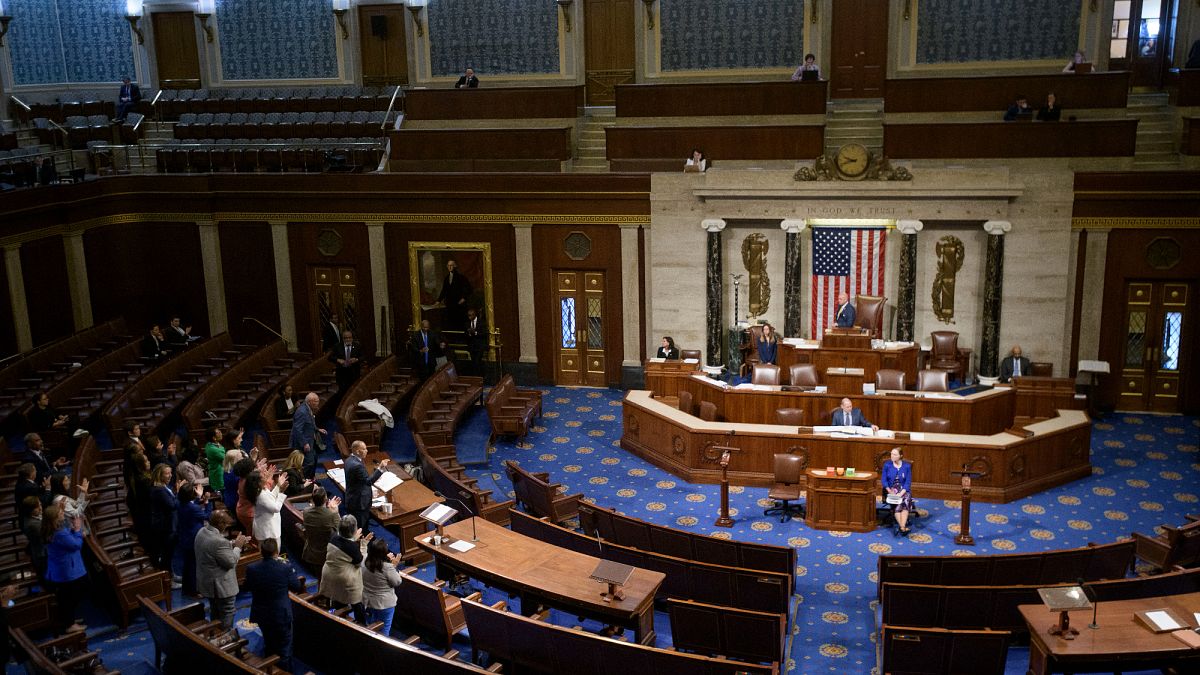The US Congress has passed President Donald Trump’s huge tax breaks and spending cuts bill, bringing an end to days of debate and overnight voting in the Capitol.
House Republicans propelled the $4.5 trillion (€3.8 trillion) One Big Beautiful Bill Act to final congressional passage on Thursday, overcoming multiple setbacks to approve Trump’s signature second-term policy package before a 4 July deadline.
The tight roll call, 218-214, came at a potentially high political cost, with two Republicans joining all Democrats opposed.
GOP leaders worked overnight and the president himself leaned on a handful of sceptics to drop their opposition and send the bill to him to sign into law.
Democratic leader Hakeem Jeffries of New York delayed voting by holding the floor for more than eight hours with a record-breaking speech against the bill.
“We have a big job to finish,” said House Speaker Mike Johnson. “With one big beautiful bill we are going to make this country stronger, safer and more prosperous than ever before.”
The outcome delivers a major win for the president and his party. It was a long-shot effort to compile a lengthy list of GOP priorities into a single 800-page package.
With Democrats unified in opposition, the bill will become a defining measure of Trump’s return to the White House, aided by Republican control of Congress.
Tax breaks and safety net cuts
At its core, the package’s priority is $4.5 trillion (€3.8 trillion) in tax breaks enacted in 2017 during Trump’s first term that would expire if Congress failed to act, along with new ones.
This includes allowing workers to deduct tips and overtime pay, and a $6,000 (€5,105) deduction for most older adults earning less than $75,000 (€63,822) a year.
There’s also a hefty investment, some $350 billion (€297 billion), in national security and Trump’s deportation agenda and to help develop the “Golden Dome” defensive system over the US.
To help offset the lost tax revenue, the package includes $1.2 trillion (€1 trillion) in cutbacks to Medicaid healthcare and food stamps, largely by imposing new work requirements, including for some parents and older people, and a major rollback on green energy tax credits.
The Congressional Budget Office (CBO) estimates the package will add $3.3 trillion (€2.8 trillion) to the deficit over the decade and 11.8 million more people will go without health coverage.
“This was a generational opportunity to deliver the most comprehensive and consequential set of conservative reforms in modern history, and that’s exactly what we’re doing,” said Jodey Arrington, the House Budget Committee chairman.
Democrats united against ‘ugly bill’
Democrats unified against the bill as a tax giveaway to the rich paid for on the backs of the working class and most vulnerable in society, what they called “trickle down cruelty.”
Tensions ran high in the chamber.
Hakeem Jeffries began his speech at 4:53 am and finished at 1:37 pm, a record eight hours and 44 minutes later as he argued against what he called Trump’s “big ugly bill.”
“We’re better than this,” Jeffries said, who used a leader’s prerogative for unlimited debate and read letter after letter from Americans writing about their reliance of the health care programmes.
“I never thought that I’d be on the House floor saying that this is a crime scene,” Jeffries said.
“It’s a crime scene, going after the health, and the safety, and the well-being of the American people.”
And as Democrats, he said, “We want no part of it.”
Hauling the package through Congress has been difficult from the start. Republicans have struggled with the bill nearly every step of the way, quarrelling in the House and Senate, and often succeeding only by the narrowest of margins: just one vote.
The Senate passed the package days earlier with Vice President JD Vance breaking the tie vote.
(Except for the headline, this story has not been edited by PostX News and is published from a syndicated feed.)

